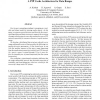Free Online Productivity Tools
i2Speak
i2Symbol
i2OCR
iTex2Img
iWeb2Print
iWeb2Shot
i2Type
iPdf2Split
iPdf2Merge
i2Bopomofo
i2Arabic
i2Style
i2Image
i2PDF
iLatex2Rtf
Sci2ools
120
click to vote
P2P
2003
IEEE
2003
IEEE
Range Addressable Network: A P2P Cache Architecture for Data Ranges
Peer-to-peer computing paradigm is emerging as a scalable and robust model for sharing media objects. In this paper, we propose an architecture and describe the associated algorithms and data structures to support the execution of range selection queries over data scattered across a P2P network especially for resource discovery in grid environments. We develop a distributed data structure referred to as a range addressable network that provides the following two quality-of-service guarantees: (i) the located peer is one with the smallest superset of the query range (important from the application perspective), and (ii) in a P2P network of n peers, a query is routed through O(log n) peers before the intended peer is found (important from the system perspective). Our preliminary experimental evaluation indicates that the range addressable network has desirable properties of scalability and load-balancing, which are crucial for the success of a large-scale P2P system.
Related Content
| Added | 05 Jul 2010 |
| Updated | 05 Jul 2010 |
| Type | Conference |
| Year | 2003 |
| Where | P2P |
| Authors | Anshul Kothari, Divyakant Agrawal, Abhishek Gupta, Subhash Suri |
Comments (0)

